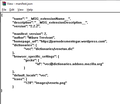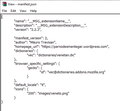
dictionary add-on and webextension
Hello everybody. I've justed ported my dictionary add-on with the new WebExtension and I'm facing a problem. In the old format (install.rdf) I can specify different name and description for each language, like this:
< em:localized > < Description > < em:locale >en< /em:locale > < em:name >name< /em:name > < em:description >description< /em:description > < /Description > < Description > < em:locale >it< /em:locale > < em:name >nome< /em:name > < em:description >descrizione< /em:description > < /Description > ...
Now (manifest.json) I see there is only one pair of name-discription, like this:
{
"name": "name", "description": "description",
...
The problem is that I didn't find a way to specify the name-description pair for other languages. Trying
{
"name": "__MSG_extensionName__", "description": "__MSG_extensionDescription__", "default_locale": "it",
... with the usual locales structure (_locales/{lang}/manifest.json) { "application_title": { "message": "name" }, "application_description": { "message": "description" } }
didn't work because when I upload my extension the AMO complains about non valid tag "default_locale". What am I doing wrong? Thank you
Geändert am
Alle Antworten (9)
hi, https://developer.mozilla.org/en-US/docs/Mozilla/Add-ons/WebExtensions/Internationalization should contain the specification for webextensions.
I already followed that, and "[...] didn't work because when I upload my extension the AMO complains about non valid tag "default_locale". [...]"
Geändert am
the article talks about a different structure (_locales/{lang}/messages.json - instead of localised manifest.json files)
no-one? that's too bad...
You put the default_locale in a locale file ? What is the error ?
Geändert am
The error I got is that of 'non valid tag "default_locale"', as if it couldn't recognize the manifest.json
Geändert am
"default_locale" should be "en" or "it". You have "vec".
Ok, but my language is not present in the ISO 639-1, so it doesn't have a two-letter code. Only in ISO 639-3 there is. If the AMO does not work with ISO 639-3 that's a serious problem from my point of view, because my language will never work.
I've tried putting "default_locale": "it", but without success.






